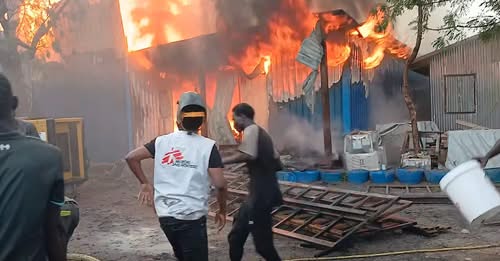
The UN Commission on Human Rights in South Sudan has strongly condemned the recent aerial bombing of a Médecins Sans Frontières (MSF) hospital in Old Fangak, Jonglei State, labelling it ‘atrocity crime’ that may constitute a war crime under international humanitarian law.
The airstrike, which occurred early Saturday, May 3, 2025, destroyed the medical facility. At least seven civilians were killed, and many others, including patients and medical staff, were injured.
The attack also destroyed the hospital’s pharmacy and crucial medical infrastructure, cutting access to lifesaving care for tens of thousands.
Further aerial bombardments were reported in the Phom area of New Fangak early on May 5, 2025, with bombs said to have landed near an international NGO compound and the County Commissioner’s office.
In a statement, the UN body called for a thorough investigation and for the perpetrators to be held accountable.
“This was not a tragic accident. It was a calculated, unlawful attack on a protected medical facility. The aerial bombing of the MSF hospital in Old Fangak is a flagrant war crime, under international law,” said Yasmin Sooka, Chair of the Commission.
“Targeting medical facilities and services violates the Geneva Conventions and represents a direct assault on foundations of humanitarian action that are intended to protect civilians in conflict zones. Those responsible must be identified, investigated and held accountable without delay,” she stated.
The attack followed a May 2 statement by the South Sudan People’s Defense Forces (SSPDF) spokesperson, who ordered retaliatory military action if hijacked vessels in Leer County were not released. The army warned of punitive aerial and riverine operations.
It remains unclear whether the attacks were carried out by government forces, as indicated by their warning.
Fangak, home to tens of thousands of civilians, was one of the nine designated ‘hostile’ counties after government forces clashed with the ‘white army’, a militia group it accuses of affiliation with Dr. Riek Machar.
“This strike does not seem to be an isolated incident—it occurred in the context of escalating ethnic profiling, unlawful detentions, and a hardening of positions within the political and military elite,” said one of the Commissioners, Barney Afako.
“Designating the entire community of Fangak as hostile is deeply irresponsible and may amount to incitement of reprisals and collective punishment. This practice must end, and such designations must be rescinded immediately.”
The destroyed MSF hospital was the only major medical facility serving the entire Fangak County, a population exceeding 110,000.
The area already faces challenges in accessing healthcare due to remoteness, seasonal flooding, and insecurity. Many patients undertake long journeys, often by canoe, to reach the facility.
Commissioner Carlos Castresana Fernández added, “The targeting of medical facilities is not only unlawful – it is inhumane.”
“Hospitals must be protected spaces, not battlegrounds. What happened in Old Fangak is symptomatic of a growing impunity and disregard for human life that must be urgently addressed.”
The Commission warned that this escalation in violence threatens South Sudan’s transition and the Revitalized Peace Agreement.
It urged visiting African Union Commission (AUC) and IGAD delegations to press for civilian protection, accountability, and a return to political dialogue.
The UN body further cautioned that continued violations of the ceasefire are pushing South Sudan dangerously close to another nationwide conflict.
“The path South Sudan is currently on is perilous,” Sooka warned. “If attacks like these continue with impunity, the Peace Agreement risks becoming meaningless. The AU, IGAD and the international community must respond decisively.”

